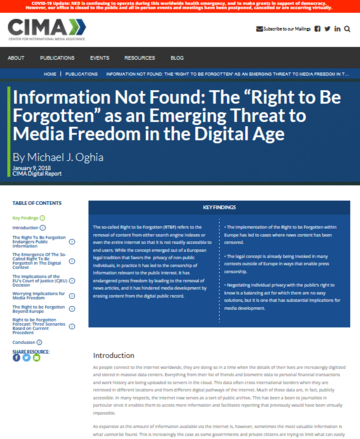
From the key findings:
The so-called Right to be Forgotten (RTBF) refers to the removal of content from either search engine indexes or even the entire internet so that it is not readily accessible to end users. While the concept emerged out of a European legal tradition that favors the privacy of non-public individuals, in practice it has led to the censorship of information relevant to the public interest. It has endangered press freedom by leading to the removal of news articles, and it has hindered media development by erasing content from the digital public record.
• The implementation of the Right to be Forgotten within Europe has led to cases where news content has been censored.
• The legal concept is already being invoked in many contexts outside of Europe in ways that enable press censorship.
• Negotiating individual privacy with the public’s right to know is a balancing act for which there are no easy solutions, but it is one that has substantial implications for media development.
From the introduction:
This report focuses on how RTBF laws and jurisprudence are already impacting content accessibility and what effects they will likely produce in the near future. It also provides an in-depth look at the ways the constellation of policies surrounding RTBF implementation threaten media development—specifically the circulation of objective, high-quality information—by highlighting how it has the power to
- Mandate newspapers and other media outlets to hide search results to relevant journalistic content, making such content less accessible and amplifying chilling effects on the type of content produced;
- Challenge the circulation of relevant, high-quality news and information, such as by retroactively censoring content produced by news and media outlets;
- Disrupt the archival history of information, one of the cornerstones of digital society, and impede the collection of data for news stories and research by making archived information inaccessible; and
- Empower governments with another tool to curb journalism and free expression.
The content of this article can be used according to the terms of Creative Commons: Attribution-NonCommercial 4.0 International (CC BY-NC 4.0) . To do so use the the wording "this article was originally published on the Resource Centre on Media Freedom in Europe" including a direct active link to the original article page.

